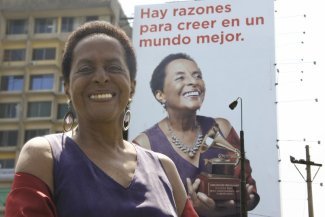Kavon Ward, a campaigner for reparations, in Marina Del Rey, California, on 6 May 2023.
Kavon Ward is seen as something of a pioneer in California. Three years ago, in 2020, as the United States was being rocked by major anti-racist demonstrations, Ward decided to launch an unprecedented battle in the Golden State to obtain the restitution of land robbed from the descendants of enslaved Africans and African Americans.
“It started shortly after the death of George Floyd,” explains Ward. “At the time, I was involved with a group of anti-racist moms in the South Bay of Los Angeles, where I lived. At some point, the history of Bruce’s Beach came up. It was the first beach on the west coast for African Americans, created in 1912 in the midst of racial segregation, by Charles and Willa Bruce who were descendants of slaves.” The seaside resort became a major success, and in 1924 “the white city council of Manhattan Beach seized Bruce’s Beach by eminent domain to build a park and dispossessed the owners of their property”.
Ward, herself a descendant of enslaved people, was moved by the story, which had largely been forgotten by Californians. She decided to mobilise the community to fight for the beach, mostly frequented by affluent white people, to be returned to the descendants of the Bruces.
After months of work alongside lawyers and campaigners for reparations, Ward and her team won their case: for the first time in the United States, the descendants of enslaved people were able to reclaim property that had been expropriated for ‘public use’, a practice that disproportionately affects African Americans.
A study by the Virginia-based Institute for Justice showed that between 1949 and 1973, the power of eminent domain was used to displace one million Americans living in ‘blighted neighbourhoods,’ two-thirds of them Black.
In 2021, while the Bruce’s Beach case was underway, Ward set up Where Is My Land, an association that helps the descendants of African Americans who have been victims of expropriation. “Currently, we have 40 active cases and we have 700 other cases waiting,” she says.
Kavon Ward’s fight for reparations is emblematic of a new generation of African American activists determined to put an end to the systemic discrimination they suffer in the United States and to close the wealth gap between white and Black Americans, two problems directly linked to the country’s history of slavery.
“Mobilisation around the issue of reparations emerged in 2017,” at the end of Barack Obama’s eight-year presidency, notes Chad Brown, spokesperson for the National Assembly of American Slavery Descendants (NAASD), an organisation born in 2019 that brings together descendants of enslaved people campaigning for reparations.
“Many of us had been disappointed and frustrated from the Obama years: lots of nice words, but little concrete action on the ground. We wanted something to finally change. And for that, it became very clear to us that the answer was to start a process of reparations,” explains Brown. “This is our chance to rebuild and replenish the economic heritage that was taken away from us all these years: the entire country built wealth on the backs of slaves, generations of Americans took advantage of this and were able to build generational wealth through inheritance. This was not our case: despite the emancipation of slaves, discrimination continued to persist against African Americans, which locked us in poverty.”
Public apologies and financial compensation
Two years later, the efforts of Chad Brown and several other figures in the reparations movement led to the creation of the country’s first statewide reparations task force. The group was tasked with formulating a series of proposals aimed at compensating Californians descended from enslaved Africans and African Americans and repairing the harm caused by slavery.
The nine experts, who are due to submit their report to California’s elected representatives around 1 July, already voted on a series of measures on 6 May: they approved a detailed report highlighting the discrimination that Black Californians have continued to suffer for decades in the areas of housing, education, police violence and incarceration.
In the panel’s opinion, reparations should include “the payment of cash or its equivalent” for eligible residents. To this end, it proposed the adoption of a model for calculating the amounts of such compensation based on the opinions of economists consulted by the task force.
The experts also recommended the creation of a new agency to provide certain assistance services to African Americans. They also considered it necessary for California to make a public apology to the descendants of the victims that acknowledges the state’s responsibility for slavery. Finally, the nine members of the task force proposed a number of social measures, including restoring voting rights to prisoners and ex-prisoners, and capping rents in neighbourhoods that have historically excluded Black people.
According to Brown, the creation of this task force represents a major step forward in a country where reparations have long been considered “a dirty word”. Reparations is “not a new idea in this country,” he explains. “Since the emancipation of slaves, a long line of civil rights activists tried to pursue reparations efforts but they ended up hitting a brick wall.”
One of the most recent advocates was John Conyers, a Democrat elected to the House of Representatives. “In 1989, he introduced a bill whose goal was to establish a commission to study and develop proposed reparations for African Americans. But the text wallowed in Congress for years and was never voted on,” says Brown.
In light of the failure of Conyers’ bill in Congress, reparations activists turned their attention to passing legislation that would establish a reparations task force in the pioneering state of California. Laws in the Golden State often have a domino effect on other states and even on federal legislation.
“Historically, some of the progressive policies that have passed in California have ended up influencing other states. I am thinking for example of texts involving affirmative action,” says Maureen Simmons, an African American consultant who authored AB 3121 (AB for ‘Assembly Bill’), the legislation adopted by the California assembly that ratified the creation of the Reparations Task Force.
During a 2019 student internship in the office of California State Assemblywoman Shirley Weber, Simmons was encouraged to work on a legislative project of her choice. “When I decided to work on reparations, at the time I had no idea it would go that far and would actually become a law. It is amazing to think that this law is driving the conversation on a federal level and that it could even have an impact on the international level, in the long term. Because after all, slavery is not just an American issue,” says Simmons. “When I think of my family and all those ancestors who were victims of chattel slavery…it’s pretty overwhelming.”
Up to US$1.2 million per person
It remains to be seen whether the elected members of the California State Legislature and the Governor of the State of California are prepared to approve the task force’s recommendations. The exact price tag on reparations is the subject of much debate in the Golden State and the focus of significant media attention.
According to estimates by economists recruited by the Reparations Task Force, the State of California could owe more than US$800 billion to the descendants of enslaved Californians, or more than 2.5 times its annual budget.
To compensate for discrimination suffered, particularly in access to healthcare, the experts of the task force propose that every African American in California descended from enslaved persons should receive US$13,619 (around €12,400) for each year of residence in California. In the area of housing, one method of calculation estimates the loss suffered at US$145,847 (€133,500) per person. According to the experts’ calculations, some people could receive up to US$1.2 million (€1.1 million) in compensation.
“I am doubtful that elected officials will agree to pass such a utopian and expensive project. Where is the money going to come from?” asks Joel Kotkin, an economist and researcher at Chapman University in California, and an opponent of reparations. “Moreover, California was never a slave state. Why should we pay for crimes committed in Alabama or Mississippi?”
According to a study published in 2021 by American sociologists Ashley Reichelmann and Matthew Hunt, only 20 per cent of white Americans would be in favour of reparations in the form of direct payments.
“Many people don’t want to admit it but everyone in the United States still benefits from slavery even if their ancestors didn’t own slaves,” says Ashley Reichelmann, a professor of sociology at Virginia Tech. “Part of the opposition to reparations among white people stems from their difficulty in admitting that American democracy is not a meritocratic nation, despite what the national myth tells us. Accepting that the modern inequalities, of which Black people are victims, are directly linked to slavery and its consequences, deeply challenges the idea of an American dream that is supposed to be accessible to any deserving individual. Suddenly, it is also their own merit that is called into question.”













